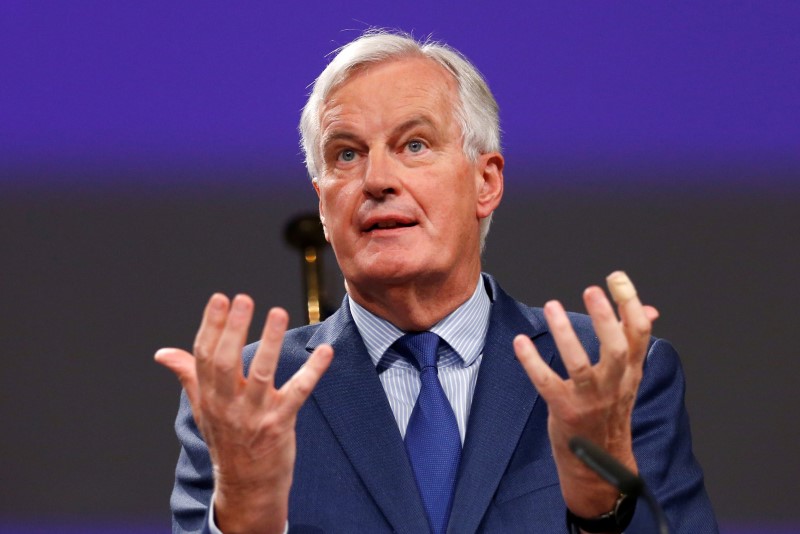 © Reuters. EU’s chief Brexit negotiator Barnier holds a joint news conference with Britain’s Secretary of State for Exiting the EU Davis in Brussels
© Reuters. EU’s chief Brexit negotiator Barnier holds a joint news conference with Britain’s Secretary of State for Exiting the EU Davis in BrusselsBRUSSELS (Reuters) – EU Brexit negotiator Michel Barnier said Britain must accept the full economic and legal status quo in a transition period after it leaves the EU and should expect no tailor-made terms on trade in its future relationship.
Suggesting a transition should run for 21 months from Brexit on March 30, 2019 until the current EU budget expires at the end of 2020, Barnier said in an interview published on Tuesday in Germany’s Handelsblatt newspaper that Britain would “certainly” remain subject to EU laws and courts during that transition.
“During this period, the EU legal framework including on jurisdiction would continue to apply to Britain,” Barnier said.
“We don’t have time to invent a new model. So for a short time after the formal exit from the EU the economic status quo would continue to apply, which besides the internal market also includes the customs union and collective political decisions.”
British Prime Minister Theresa May has proposed a transition of around two years in order to give time to put a new free trade pact in place, although she faces opposition in London from some Brexit supporters who want a clean, quick break.
Barnier noted that May had rejected the option of staying in the EU single market long-term — the “Norwegian model” as he called it, referring to Norway’s membership of the EU internal market, accepting all its rules and costs without having a say.
“So we must work on other hypotheses,” he said. “Another option would be a free trade treaty using the example of the CETA agreement with Canada. It would take several years, however, to negotiate such an agreement.”
Asked if that meant there could be “a specifically British model” along the lines of the “bespoke arrangements” May has referred to without giving detail, Barnier replied simply: “No.”
He said that it was unclear how a transition period would affect EU trade deals with other countries and said that the EU would have to discuss the issue with those states concerned.
He said his staff were already working on drafting a withdrawal treaty that will include terms for transition.
Barnier said he still hoped that May could provide more detail on her offer to meet British financial commitments on withdrawal so that EU leaders could agree in December to end their refusal to negotiate a future trade deal.
May told an EU summit last week that she could not agree a figure until she knows what trade terms the EU offers. Barnier said it was important to “de-dramatise” talks on the payment.
Fusion Media or anyone involved with Fusion Media will not accept any liability for loss or damage as a result of reliance on the information including data, quotes, charts and buy/sell signals contained within this website. Please be fully informed regarding the risks and costs associated with trading the financial markets, it is one of the riskiest investment forms possible.
Source: Investing.com





























